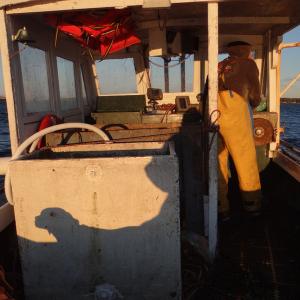Built to fall apart
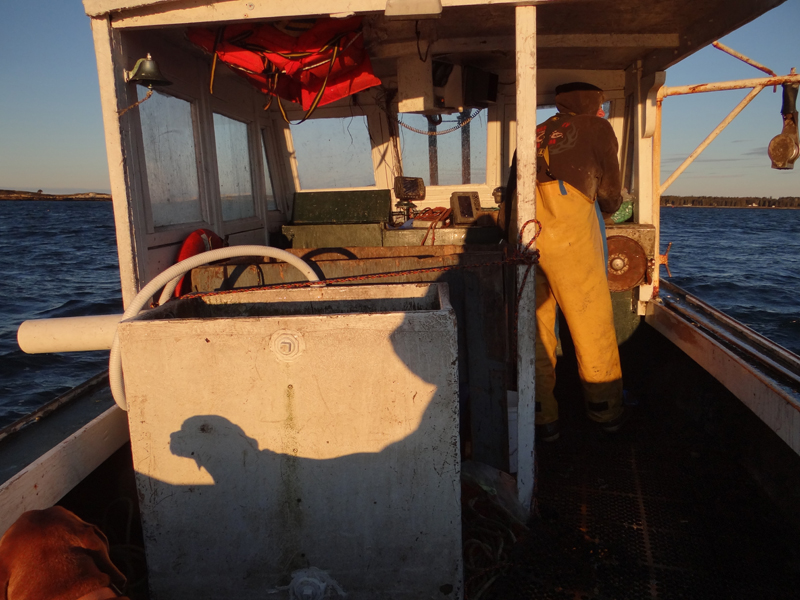 Photo Shlomit Auciello
Photo Shlomit Auciello
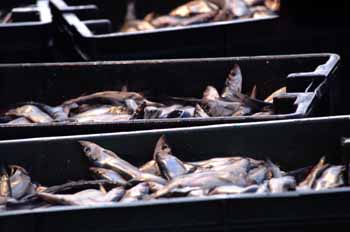 Herring - the bottom of the kobsterman's food chain. (Photo Shlomit Auciello)
Herring - the bottom of the kobsterman's food chain. (Photo Shlomit Auciello)
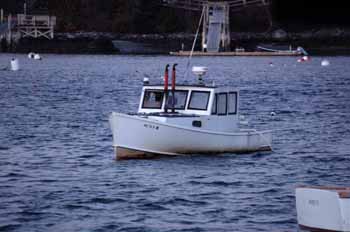 Gary Libby's Mizkim is small, compared to most modern lobsterboats. (Photo Shlomit Auciello)
Gary Libby's Mizkim is small, compared to most modern lobsterboats. (Photo Shlomit Auciello)
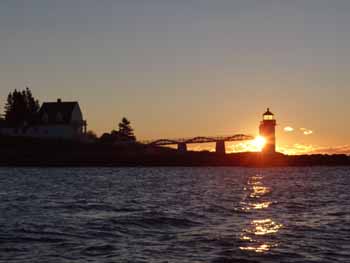 Day breaks behind Marshall Point lighthouse as the lobsterman's day begins. (Photo Shlomit Auciello)
Day breaks behind Marshall Point lighthouse as the lobsterman's day begins. (Photo Shlomit Auciello)
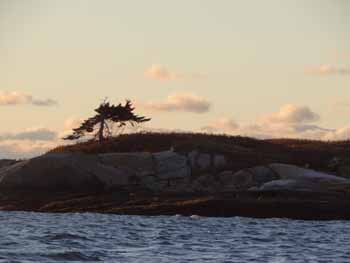 Photo Shlomit Auciello
Photo Shlomit Auciello
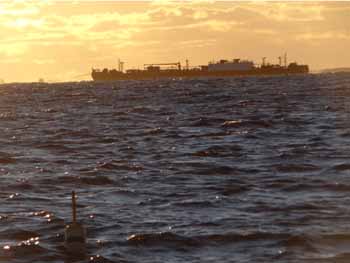 Even big ships, such as this one, will be worn away by the endless sea. (Photo Shlomit Auciello)
Even big ships, such as this one, will be worn away by the endless sea. (Photo Shlomit Auciello)
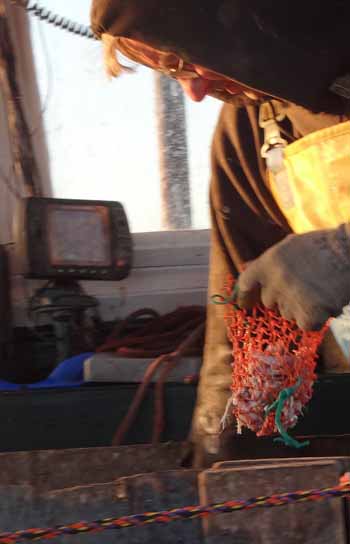 Gary Libby fills one of more than 100 bait bags that he will stuff with herring on this "short" work day. (Photo Shlomit Auciello)
Gary Libby fills one of more than 100 bait bags that he will stuff with herring on this "short" work day. (Photo Shlomit Auciello)
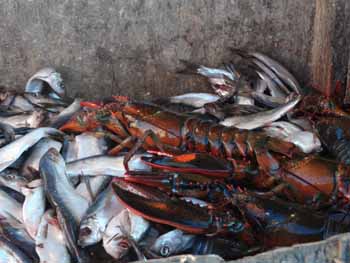 Eat or be eaten. (Photo Shlomit Auciello)
Eat or be eaten. (Photo Shlomit Auciello)
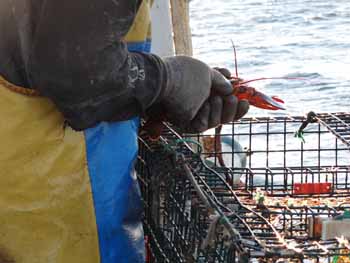 Gary Libby measures every lobster that he finds in his traps. At this time of year, most are too small to be kept. (Photo Shlomit Auciello)
Gary Libby measures every lobster that he finds in his traps. At this time of year, most are too small to be kept. (Photo Shlomit Auciello)
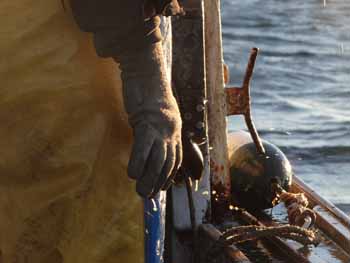 Fishing gear wears out quickly with exposure to the elements. (Photo Shlomit Auciello)
Fishing gear wears out quickly with exposure to the elements. (Photo Shlomit Auciello)
 Photo Shlomit Auciello
Photo Shlomit Auciello
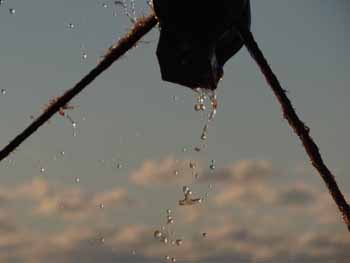 Nothing stays dry. (Photo Shlomit Auciello)
Nothing stays dry. (Photo Shlomit Auciello)
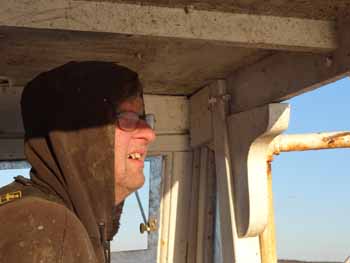 Fisherman Gary Libby, of Port Clyde, watches the water endlessly as he tends his lobster traps. (Photo Shlomit Auciello)
Fisherman Gary Libby, of Port Clyde, watches the water endlessly as he tends his lobster traps. (Photo Shlomit Auciello)
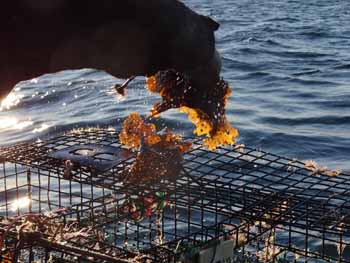 Exposure to the elements and colonization by marine life take their toll on traps and other fishing gear. (Photo Shlomit Auciello)
Exposure to the elements and colonization by marine life take their toll on traps and other fishing gear. (Photo Shlomit Auciello)
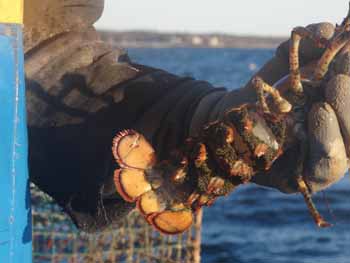 On this chilly day near the end of October, the only really big lobsters came up covered with eggs and were returned to their briny home. (Photo Shlomit Auciello)
On this chilly day near the end of October, the only really big lobsters came up covered with eggs and were returned to their briny home. (Photo Shlomit Auciello)
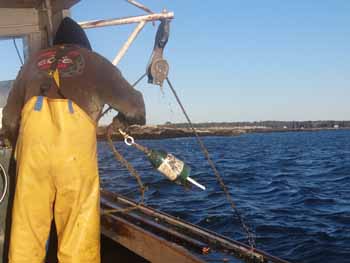 Gary Libby said he prefers working the ground fishery to the repetitive nature of lobstering. (Photo Shlomit Auciello)
Gary Libby said he prefers working the ground fishery to the repetitive nature of lobstering. (Photo Shlomit Auciello)
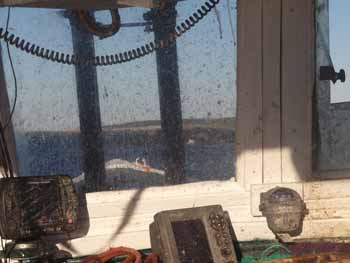 Every piece of equipment on a working boat needs constant care. (Photo Shlomit Auciello)
Every piece of equipment on a working boat needs constant care. (Photo Shlomit Auciello)
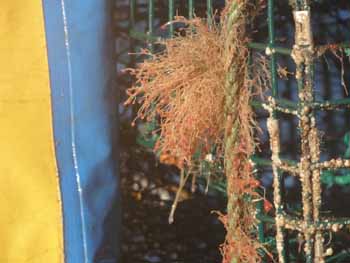 Photo Shlomit Auciello
Photo Shlomit Auciello
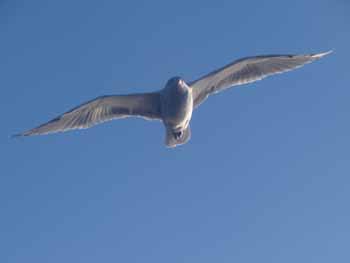 Photo Shlomit Auciello
Photo Shlomit Auciello
 Although he suspects them of emptying his traps before he can haul them, Gary Libby likes the seals with whom he shares the bay. (Photo Shlomit Auciello)
Although he suspects them of emptying his traps before he can haul them, Gary Libby likes the seals with whom he shares the bay. (Photo Shlomit Auciello)
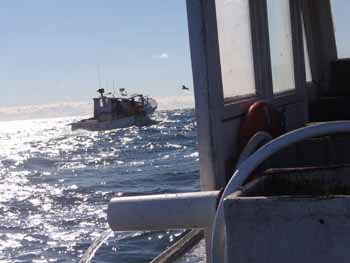 Photo Shlomit Auciello
Photo Shlomit Auciello
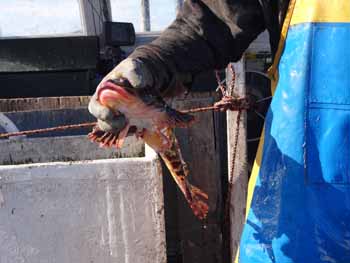 Bycatch gets tossed overboard. (Photo Shlomit Auciello)
Bycatch gets tossed overboard. (Photo Shlomit Auciello)
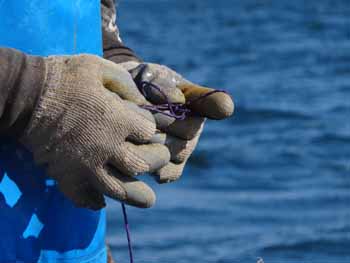 A temporary repair is made during on of the last hauls of Gary Libby's 2013 lobster season. (Photo Shlomit Auciello)
A temporary repair is made during on of the last hauls of Gary Libby's 2013 lobster season. (Photo Shlomit Auciello)
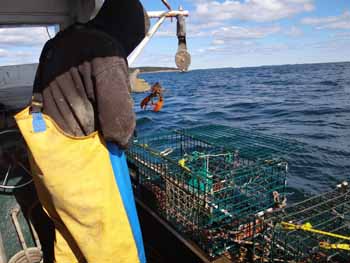 One of dozens of lobsters returned to the deep. (Photo Shlomit Auciello)
One of dozens of lobsters returned to the deep. (Photo Shlomit Auciello)
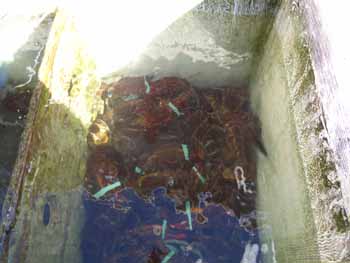 Photo Shlomit Auciello
Photo Shlomit Auciello
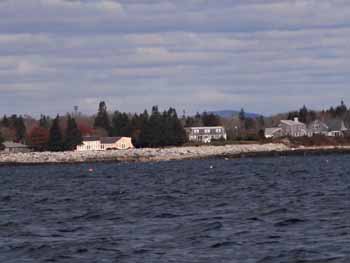 Like the softly rounded Camden Hills behind them, even these well-built houses were not meant to last forever. (Photo Shlomit Auciello)
Like the softly rounded Camden Hills behind them, even these well-built houses were not meant to last forever. (Photo Shlomit Auciello)
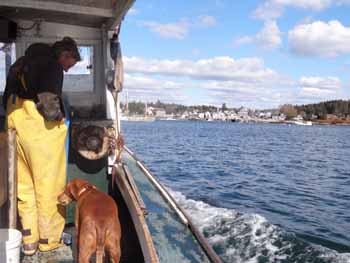 A man and his dog return home after a hard morning's work. (Photo Shlomit Auciello)
A man and his dog return home after a hard morning's work. (Photo Shlomit Auciello)
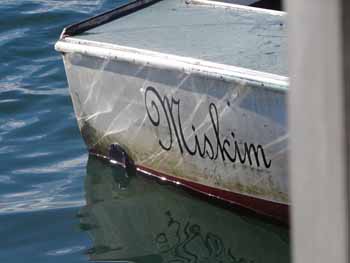 Photo Shlomit Auciello
Photo Shlomit Auciello
 Nothing lasts forever. (Photo Shlomit Auciello)
Nothing lasts forever. (Photo Shlomit Auciello)
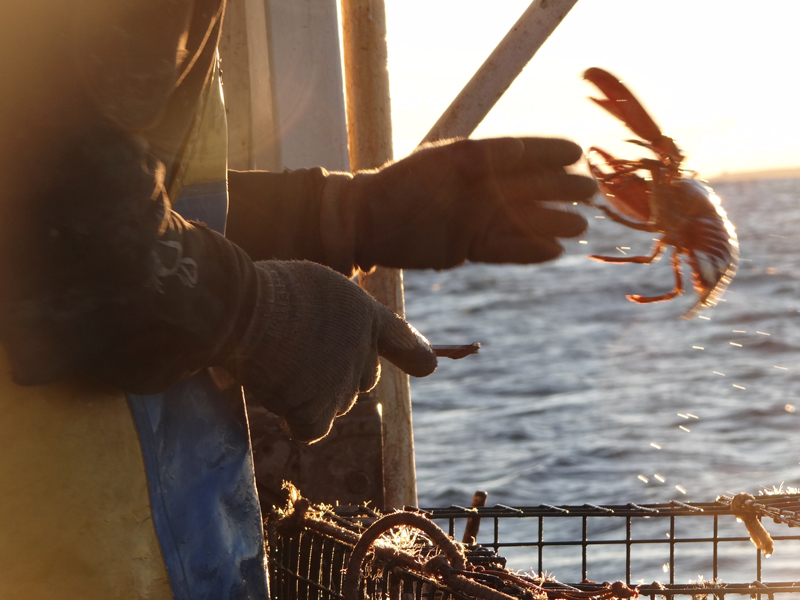
 Photo Shlomit Auciello
Photo Shlomit Auciello
 Herring - the bottom of the kobsterman's food chain. (Photo Shlomit Auciello)
Herring - the bottom of the kobsterman's food chain. (Photo Shlomit Auciello)
 Gary Libby's Mizkim is small, compared to most modern lobsterboats. (Photo Shlomit Auciello)
Gary Libby's Mizkim is small, compared to most modern lobsterboats. (Photo Shlomit Auciello)
 Day breaks behind Marshall Point lighthouse as the lobsterman's day begins. (Photo Shlomit Auciello)
Day breaks behind Marshall Point lighthouse as the lobsterman's day begins. (Photo Shlomit Auciello)
 Photo Shlomit Auciello
Photo Shlomit Auciello
 Even big ships, such as this one, will be worn away by the endless sea. (Photo Shlomit Auciello)
Even big ships, such as this one, will be worn away by the endless sea. (Photo Shlomit Auciello)
 Gary Libby fills one of more than 100 bait bags that he will stuff with herring on this "short" work day. (Photo Shlomit Auciello)
Gary Libby fills one of more than 100 bait bags that he will stuff with herring on this "short" work day. (Photo Shlomit Auciello)
 Eat or be eaten. (Photo Shlomit Auciello)
Eat or be eaten. (Photo Shlomit Auciello)
 Gary Libby measures every lobster that he finds in his traps. At this time of year, most are too small to be kept. (Photo Shlomit Auciello)
Gary Libby measures every lobster that he finds in his traps. At this time of year, most are too small to be kept. (Photo Shlomit Auciello)
 Fishing gear wears out quickly with exposure to the elements. (Photo Shlomit Auciello)
Fishing gear wears out quickly with exposure to the elements. (Photo Shlomit Auciello)
 Photo Shlomit Auciello
Photo Shlomit Auciello
 Nothing stays dry. (Photo Shlomit Auciello)
Nothing stays dry. (Photo Shlomit Auciello)
 Fisherman Gary Libby, of Port Clyde, watches the water endlessly as he tends his lobster traps. (Photo Shlomit Auciello)
Fisherman Gary Libby, of Port Clyde, watches the water endlessly as he tends his lobster traps. (Photo Shlomit Auciello)
 Exposure to the elements and colonization by marine life take their toll on traps and other fishing gear. (Photo Shlomit Auciello)
Exposure to the elements and colonization by marine life take their toll on traps and other fishing gear. (Photo Shlomit Auciello)
 On this chilly day near the end of October, the only really big lobsters came up covered with eggs and were returned to their briny home. (Photo Shlomit Auciello)
On this chilly day near the end of October, the only really big lobsters came up covered with eggs and were returned to their briny home. (Photo Shlomit Auciello)
 Gary Libby said he prefers working the ground fishery to the repetitive nature of lobstering. (Photo Shlomit Auciello)
Gary Libby said he prefers working the ground fishery to the repetitive nature of lobstering. (Photo Shlomit Auciello)
 Every piece of equipment on a working boat needs constant care. (Photo Shlomit Auciello)
Every piece of equipment on a working boat needs constant care. (Photo Shlomit Auciello)
 Photo Shlomit Auciello
Photo Shlomit Auciello
 Photo Shlomit Auciello
Photo Shlomit Auciello
 Although he suspects them of emptying his traps before he can haul them, Gary Libby likes the seals with whom he shares the bay. (Photo Shlomit Auciello)
Although he suspects them of emptying his traps before he can haul them, Gary Libby likes the seals with whom he shares the bay. (Photo Shlomit Auciello)
 Photo Shlomit Auciello
Photo Shlomit Auciello
 Bycatch gets tossed overboard. (Photo Shlomit Auciello)
Bycatch gets tossed overboard. (Photo Shlomit Auciello)
 A temporary repair is made during on of the last hauls of Gary Libby's 2013 lobster season. (Photo Shlomit Auciello)
A temporary repair is made during on of the last hauls of Gary Libby's 2013 lobster season. (Photo Shlomit Auciello)
 One of dozens of lobsters returned to the deep. (Photo Shlomit Auciello)
One of dozens of lobsters returned to the deep. (Photo Shlomit Auciello)
 Photo Shlomit Auciello
Photo Shlomit Auciello
 Like the softly rounded Camden Hills behind them, even these well-built houses were not meant to last forever. (Photo Shlomit Auciello)
Like the softly rounded Camden Hills behind them, even these well-built houses were not meant to last forever. (Photo Shlomit Auciello)
 A man and his dog return home after a hard morning's work. (Photo Shlomit Auciello)
A man and his dog return home after a hard morning's work. (Photo Shlomit Auciello)
 Photo Shlomit Auciello
Photo Shlomit Auciello
 Nothing lasts forever. (Photo Shlomit Auciello)
Nothing lasts forever. (Photo Shlomit Auciello)

PORT CLYDE — Gary Libby's main thing is ground fishing. Mostly for dabs, a flatfish similar to flounder, and also for scallops, but like most fishermen, he follows the species of the season. When I first met him, in 2008, he was working on a better way of catching shrimp. This past week, as the cold season was establishing itself along the Midcoast, Gary Libby was making one of his final hauls of the lobster season.
Libby's boat, Mizkim, is small compared to a lot of lobster boats, and he does not carry a sternman. Instead, he is accompanied by Red, a Rhodesian Ridgeback and pit bull mix he got for free a half dozen years ago in Freedom.
The last time I came to see him at the co-op dock, Libby was up to his elbows in grease, replacing an engine gasket on the boat he does most of his fishing from. Now that engine needs serious work, and his lobstering income will go toward that repair.
The day will be a short one, he tells me, a bit more than 100 traps to haul. We leave the dock at 7 a.m. and will get back around 1 p.m. During those six hours, I'll watch him repeat the same motions, gaffing in the buoy, running the line over the power hauler and keeping it on track, lifting the trap onto the boat's rail, opening it and clearing out the seaweed, sorting the keepers from the lobsters that are too small or too fertile to keep, stuffing two or three handfuls of herring into the knitted bait bag, securing the bag in the trap, closing it back up and pushing it back into the sea, just in time to grab the gaff and start the process all over again.
“It's hard work,” I observe, about halfway through a morning in which he's thrown back far more than he's kept.
“I like hard work,” he replies, and I think he'd better, because he's doing a lot of it for the half crate of lobsters he'll take to the dock today. The work I do has never been this physical, and rarely demands the sort of multi-tasking attention to dangerous detail that any kind of fishing calls for. Gary is five years younger than I am, but the quality of his labor probably means his body is feeling quite a bit older than mine is at 60.
The hardware is getting old, as well.
Traps come up with separated runners, bent out of any kind of straight line, caked with this year's growth of marine wildlife. Trap line is wearing and carries all kinds of flora, and some tiny specimens of fauna as well. All of this will have to be inspected during the winter, and repaired or replaced by spring.
So maybe it's fortunate that there is unlikely to be a shrimp season in 2014. Usually, Gary goes out for shrimp during the really cold part of the year. But he tells me the Atlantic States Marine Fisheries Commission’s Northern Shrimp Section Technical Committee is calling for no season at all this year, after a 72 percent cut in quotas last year. That's sad for all of us who enjoy pandalus borealis, commonly known as Northern or pink shrimp, but it's a chunk of physical existence for a family like the Libbys.
But, between his lobster boat and gear, the engine on his larger boat, and the regular annual maintenance that all boats and gear needs, Gary has a lot of work to do. With the right attitude, I guess you can call it a blessing.
Although I'm dressed for the occasion in layers of wool and polypropylene, covered with waterproof foul weather gear, the endless spray and cold get to me by the end of the morning. One of my cameras is refusing to work, probably the batteries responding to the temperature; a second has locked its mirror and will need to be dealt with at home. I'm relying on the least flexible, but newest, one and am shooting in bursts in order to get as many pictures as I can. It means more time later, sorting and eliminating, but opportunities such as this are rare and worth the time I'll later spend revisiting my day on the water.
My camera pack rests on top of my dry clothes bag. By the end of the run that bottom layer will be soaked, but the cameras will stay dry.
Gary Libby's short day wears me out, and I don't gaff any buoys or raise a single trap. I do not fill even one of more than 100 bags with slimy bait or watch endlessly for the thousand hazards that any mariner must observe. I just make pictures.
On the way home, I stop in to see my friend Robert. He's older than I and starts to tell me about some pain he's been experiencing. Feeling blustery after my morning on the water I choose to give him advice. He probably gets a lot of that; we all do and I should know better than to give away what I don't want myself. It's like offering a farmer a load of overgrown zucchinis.
The only true thing to say is that we all are built to fall apart. Us and our machines and the ecosystem we all live in. After watching a large handful of friends and relatives die in the last year, all of biological decay and ranging in age from mid-60s to mid-80s, it's becoming clear that is the way of things. If we are to make room for new life, and even new machines, we have to allow for the natural course of decay.
When I get to Route 1, I find myself behind a car with a license plate reading “RKPT-ME” and wonder who's declaring naming rights to that little town. Drawing close, I see within the Lexus of Greenwich frame a Connecticut plate asking its readers to “Preserve the Sound.”
I'll try to break this to you gently, “RKPT-ME.” Your precious beach wasn't meant to be preserved. It was meant to be picked up by the tide and storm surge, to be moved back and forth along the shore, into estuaries and out onto banks. In ways we do not even try to understand, that movement and change is what feeds the complex universe that makes for little baby shrimps and all the other related life on which we depend. When we hold back the tide we endanger much more than our busy brains can comprehend.
None of this should last forever. Least of all these words and pixels. Enjoy them while they are here and watch as they leave their meaning to drift in and out with the breaking foam.
Event Date
Address
Port Clyde, ME 04855
United States

